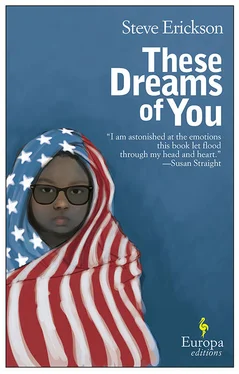“Well, a lot do. Maybe most. But no more so than those who don’t believe.”
“How’s that?”
“Not believing because you need not to, no less so than the person who does.”
Brown shakes his head. “Not following.”
“Sure you are.” Everyone picks arguments with me these days! thinks Zan.
“I don’t believe because there’s no intelligent reason to.”
“Horseshit.”
“You’ve become rather more forceful than when I used to know you, Alexander. Rather more talkative.”
“So everyone tells me lately. Maybe I always think I’m on the radio.”
“Or the vodka perhaps.”
“Probably.”
“But that doesn’t mean that what you say makes more sense, does it?”
“Listen, if you’re being purely rational about it, then agnosticism is the only stance that has any logic to it. The atheist is just another kind of zealot. You’re zealous in your non-belief but the zealotry is no different from the zealotry of faith.”
“But how can you believe in God?”
“Fifty-one days out of a hundred. . ”
“Explain to me one day out of a hundred.”
“Who cares?”
“Meaning you can’t answer, can you?”
“Meaning do you care.”
“I’m positively riveted.”
“Because it makes more sense to me,” says Zan.
“God makes more sense?”
Zan explains, or tries to, and Brown does him the courtesy of appearing to be absorbed if in no way persuaded. “Right, then,” he says, with a small gesture of his hand, “so why not a hundred days out of a hundred?”
“I’m scandinavian,” Zan explains. “We don’t do joy.”
On his third vodka Zan muses out loud, “Ronnie Jack Flowers.”
Brown makes that little gesture with his hand again. “Don’t know him.”
“ I knew him,” Zan says, “twenty, twenty-five years—”
“Are you all right?” Brown interjects.
“Why? Don’t I seem all right?”
“Oh, certainly.”
“Do I seem drunk?”
“Not necessarily. But then I’m not sure I would know, would I? With you, I mean.”
“Twenty, twenty-five years ago. . ”
“Ronnie Joe. . ”
“Ronnie Jack. Black, hard-left politically. Radical politics in the Sixties, militant. . ”
“Panthers, then.”
“I don’t know. Maybe. But armed resistance, anyway, up against the wall, all that. I think I am a bit drunk.” Zan holds his head a moment. Because he’s prone to migraines, it’s normal that with the first sip of liquor his head begins throbbing. “But when I knew him, like everyone in the Eighties, he had left the Sixties behind.”
It was a common story in the Eighties, of course — former Sixties radicals in the mainstream, doing well. Ronnie Jack loved the best clothes, the best cars, the best stereo equipment, good food, beautiful women — the Stalinist from Esquire , still talking left “and I mean left,” says Zan, “I don’t mean New Left, I mean Marxist-Leninist left,” which seemed quaint even with the Cold War still going on. Ronnie Jack took the good-will trips to the Soviet Union and considered the people there to “have it pretty good,” in his words; and if, as Zan did once or twice, the contradiction was noted between Ronnie’s politics and the high life he lived, Ronnie would answer, I just think everyone should have the best clothes and best cars and best stereo equipment and beautiful women.
Zan and Ronnie Jack worked in the same building, where the former wrote for a travel magazine and the latter was in the public relations department of an insurance firm. They met through Jenna, a Stalinist that Zan was dating and with whom Ronnie Jack — more the ladies’ man than Zan ever was — had gotten nowhere. “Wait,” Brown says now, “you were dating a Stalinist?”
What can Zan say? She was a hot Stalinist. Brown hair, brown eyes, the smile and body of an italian starlet. “But didn’t the fact,” says Brown, “that she was a Stalinist. .?”
“Oh, of course,” scoffs Zan. “But you know, I convinced myself it was somehow no different than one of us being a Republican and the other a Democrat, and particularly since I was neither, I thought we just wouldn’t talk politics. What I didn’t know is that if you’re a Stalinist, there’s nothing that isn’t political.” Jenna literally was a card-carrying member of the Party even if Zan never saw the card; and he was so fraught to sleep with her that he went to a couple of meetings, where everyone was ancient, the median age well over seventy — so it became obvious what the Party saw in Jenna, which was the same thing Zan saw: a sexy young woman in her mid-twenties, putting a beautiful and glamorous face on the movement.
After that, it became difficult for Zan to take seriously certain national paranoias. The idea that these codgers were going to take over the country, that the country had to be on its guard against them every moment, was laughable, not only because they were feeble in body but because among them there wasn’t a single independent thought. If, for instance, in the course of one of Jenna’s monologues about fascism it was pointed out that Stalin and Hitler had a pact, Jenna denied it ever happened, insisting it was a creation of an elitist media — something Zan hears back home now, where no compass is consulted in common, where the designation of north is considered by some a state plot, where facts and information are the coordinates of suspect maps, where people who actually know things are the enemies of “common sense.” Soon sex with Jenna wasn’t worth it anymore, not least because sexual licentiousness was yet another myth about a doctrinaire Left that in fact regarded eroticism as decadence, a mass social opiate like religion. She was the single most repressed woman he ever knew.
What survived Zan’s affair with Jenna, at least for a while, was a friendship with her comrade if not lover Ronnie Jack. Perhaps the fact that neither man was sleeping with Jenna provided a bond. Then Zan got fired from the travel magazine for “insubordination” and being a “disruptive influence,” the last time until lately that he was considered by anyone as volatile, and which he took as a sign to finish what still could be called his most recent novel—“most recent!” Zan laughs to Brown. “That makes it sound, well, fucking recent , doesn’t it?” In the novel was a very small character, a few paragraphs in a single chapter, based on Ronnie. Zan changed a detail or two but not, as it turned out, enough, because when the book was published, someone in the insurance company where Ronnie worked read it and concluded that the black man working in his department was the Stalinist with a militant past in the Sixties — and Ronnie lost his job.
Zan pleads to Brown, “What are the odds? This was twenty years after all the Panther stuff, if that’s what it was, and this novel was read by, you know, a hundred and thirteen people on the planet, eighty-seven of them in Japan or some place — and one just happens to work in the same insurance company as Ronnie Jack Flowers? It was enough to make me believe in all their conspiracies after all. And what I didn’t understand in my white naïveté is that west of Connecticut there literally was a single black executive in the insurance business. If I just had left out the word ‘insurance,’ nothing would have happened. One detail too many. Mostly, though, I thought, Who cares? And of course that was the most naïve thing of all. Who cares anymore what anyone did in the Sixties? Isn’t half the workforce former radicals now paying into pension funds?”
Читать дальше











